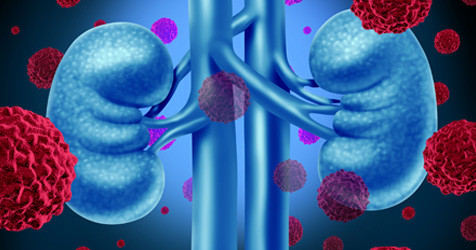WHAT IS KIDNEY CANCER?
This is cancer that starts in the kidney. The most common type of kidney cancer is called renal cell carcinoma (RCC). About 90% of all kidney cancers are RCC. The other 10% are transitional cell carcinomas, Wilms tumors (in children), and other rare tumors.
ARE THERE DIFFERENT TYPES OF RENAL CELL CARCINOMA (RCC)?
Yes, there are many different types of RCC. A pathologist can name them under a microscope based on how they look. Here are some of the types:
- Clear Cell
- Papillary
- Chromophobe
- Collecting duct
WHO GETS KIDNEY CANCER?
Men get kidney cancer more often than women do. People who smoke are more likely to get kidney cancer than nonsmokers are. Here are some other risk factors:
- Having Von Hippel-Lindau disease
- Family history of kidney cancer
- Obesity
- Regular contact with chemicals, such as cadmium, benzene, or asbestos
WHAT ARE THE SYMPTOMS OF KIDNEY CANCER?
In the early stages, kidney cancer often causes no symptoms. As the cancer grows, symptoms may develop. The most common symptoms in people with kidney cancer include:
- Blood in the urine
- Side or back pain
- A mass or lump in the side or lower back
- Ongoing tiredness
- Appetite loss
- Fast weight loss that happens without any effort to lose weight
- Fever with no known cause
- Leg or ankle swelling
- High blood pressure
HOW IS KIDNEY CANCER DIAGNOSED?
There are various ways to find out if a person has kidney cancer. They include:
- The doctor asks about the person's health history. He or she also asks about the person's family history of kidney cancer and other conditions that may be related to kidney cancer.
- A small amount of urine is collected in a container. It is then tested for blood, protein, bacteria, and cancer cells.
- A complete blood count (CBC) and blood chemistry test can show signs in the blood that are linked with kidney cancer.
- Tests, including CT scan, ultrasound, Intravenous pyelogram (IVP), and angiography, are used to take pictures of the inside of a person's body.
- Biopsy is done by taking a sample and examined under a microscope. For kidney cancer, the type of biopsy used is called fine needle aspiration (FNA).
HOW IS KIDNEY CANCER TREATED?
Someone with kidney cancer may have only one of the following treatments. Or they may have more than one:
- Surgery: This is done to remove the tumor from the kidney. The whole kidney may be taken out, or only the part of the kidney with the tumor may be removed.
- Targeted Therapy: These medicines attack specific areas in the cancer cells or target the tumor's blood supply. This is the most common treatment for more advanced kidney cancers.
- Biological Therapy: This is used to treat the cancer and reduce the chance that the cancer will spread to other parts of the body.
- Radiation Therapy: This is used to kill cancer cells using high energy X-rays.
- Chemotherapy: This is used to try to kill the cancer cells in the kidney and those that have spread to other organs.
- Ablation Therapy: There are 2 main types of ablation therapy used to treat kidney cancer. They’re both done by putting a needle into an area of cancer cells.
- Radiofrequency ablation (RFA) uses energy waves to kill cancer cells.
- Cryoablation uses extreme cold to kill cancer cells.
WHY KIMS?
At KIMS, our goal is to accurately diagnose and treat Kidney cancer so that you have the best possible quality of life. At every step, we’ll work with you to determine the best treatment approach. We work to ensure that you have access to innovative techniques, new drugs, and clinical trials if appropriate. We also offer comprehensive follow-up care and survivorship programs for each of our patients with kidney cancer.

